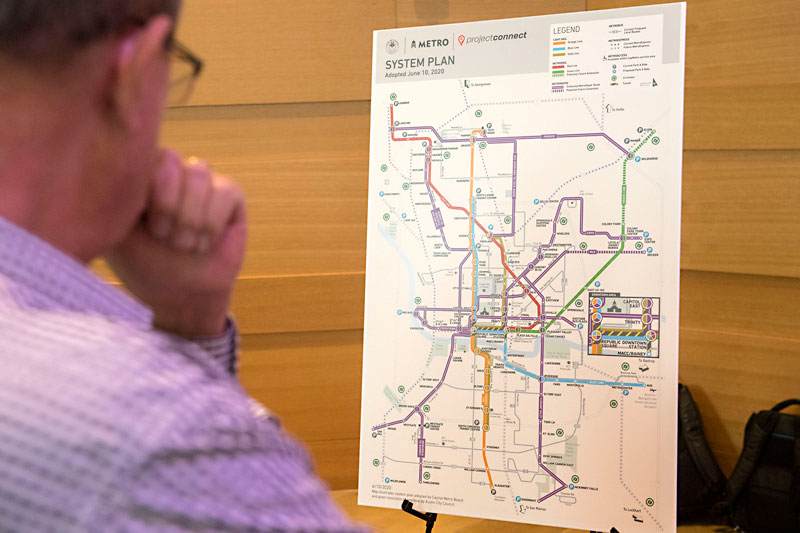Another Big Year for Austin’s Transit Overhaul
Project Connect will hit milestones and legal battles in 2025
By Benton Graham, Fri., Dec. 20, 2024

The coming year figures to be an eventful one for Project Connect – Austin’s $7.1 billion public transit overhaul. The program will likely face a challenging environment at the federal, state, and even local level.
At the same time, Capital Metro plans to launch a core aspect of Project Connect: two new MetroRapid bus lines. According to a Cap Metro spokesperson, the Expo Center and Pleasant Valley higher-frequency bus lines will begin test rides early next year and launch in the spring.
The Austin Transit Partnership, the organization leading the Project Connect implementation, also plans to release its draft environmental impact statement either late this year or early next year. Jennifer Pyne, who serves as ATP’s executive vice president of planning, community, and federal programs, said following that milestone, ATP will host public meetings with updates on project design.
Pyne said the light rail is expected to begin construction in 2027. ATP will begin solicitation for the final designer and builder next year. Once that decision is made, ATP will have a more precise date for when the first riders will be using the light rail, but right now it estimates that will be in 2033.
The federal government will also play an important role in the project’s development, footing about half of its bill. Despite the change from a Biden to a Trump administration, Pyne said she expects that ATP will likely continue working with many of the same Federal Transit Administration staff, noting that they are “career personnel.” She added that she “wouldn’t be surprised” if the new administration prioritizes “job creation and economic opportunities that a big investment like this infrastructure investment provide.”
Project Connect could face challenges at the state level. During Texas’ 2023 legislative session, Rep. Ellen Troxclair, R-Lakeway, sought to block local government corporations, like ATP, from issuing bonds through property taxes. Her bill did not pass, but the Legislature is set to reconvene in 2025. While bill filing has begun, at the time of publication, Troxclair had not filed a bill targeting Project Connect.

Legal battles have also hung over the project. In 2023, a local group filed a lawsuit, claiming the updated project designs were not in line with designs that had been shown when voters approved Project Connect in 2020. Bill Aleshire and Rick Fine, co-counsels in the lawsuit, referred to the revised plan as a “bait and switch” in an email. The group filed a second lawsuit in September challenging the adoption of the Project Connect tax rate. Aleshire and Fine said in an email that, broadly, they would prefer investment in a bus rapid transit system to a light rail.
Earlier this year, ATP filed a lawsuit to validate the bond it is using to fund the project. A trial to join the ATP suit and the Project Connect opponents’ first suit was stalled after an appeal by Attorney General Ken Paxton in June. The appeal was dismissed by the 15th Court of Appeals in October. Now, both sides are again awaiting a trial for all three cases.
Aleshire and Fine said their coalition is hopeful that it “will get the chance to have a trial on the merits of our cases. We feel very strongly that the law is on our side.”
An ATP spokesperson stated that the organization has “followed the law in advancing Austin Light Rail and remain[s] ready for trial. Project opponents have taken unprecedented measures to delay these proceedings. The law does not support their position. The 15th Court of Appeals has now twice denied baseless attempts by project opponents to further delay these proceedings, and we are optimistic that we will have our day in court soon.”
Nonetheless, as the obstacles and distractions mount, Pyne said ATP remains confident in the direction of the project and the progress made thus far. “We feel really good about how it’s going,” she said. “I would just encourage people to check out our meetings and other information that’s available in the new year.”
Editor's Note Monday, 4:41pm: A previous version of this story stated Bill Aleshire and Rick Fine were plaintiffs in a lawsuit; they are co-counsels representing a number of plaintiffs. The Chronicle regrets the error.
Got something to say on the subject? Send a letter to the editor.








